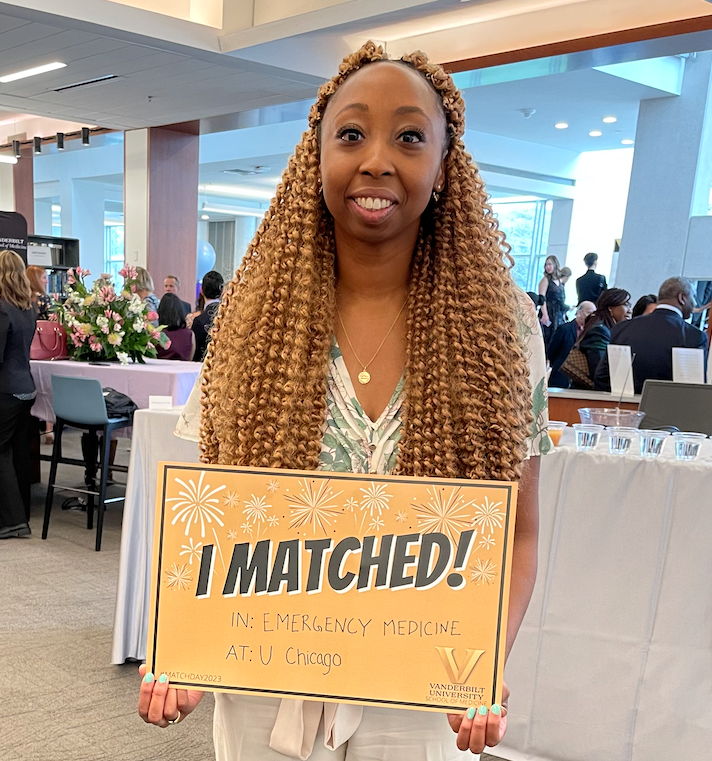Our Student Spotlight celebrates student members of the Meharry-Vanderbilt community, whose achievements reflect the MVA’s commitment to enhance and support high-impact translational research, interprofessional learning, and community engagement. This month, the MVA talked with Eki Olumese from Vanderbilt University School of Medicine.
Where are you headed for your residency?
University of Chicago for Emergency Medicine. It’s a 3-year residency where I will spend a lot of my time in the ER, but also will rotate in several intensive care units, including the trauma ICU, medical ICU, cardiac ICU, and the surgical ICU. I’ll also spend some time on Labor and Delivery and Anesthesia services, and a few other services. Outside of the ER, I am excited to mentor underrepresented students of various levels and to engage in health advocacy work with the South Side community.
What is your specialty and why did you choose it? 
During rotations in med school, I found myself drawn to the sickest patients and really found that I enjoyed the variety and pace of the emergency room. I realized I wanted to be there to support patients through days that could be some of the worst in their lives. A lot of healthcare disparities converge and emerge in the emergency room. I want to provide equitable care to patients and connect them with resources to limit their visits to the emergency room. Additionally, I began growing my professional interest in Global health during my Master's program in Health, Medicine and Society from the University of Cambridge in England. Within Health, Medicine and Society, they had a concentration on the History of Medicine, and I got to delve into the effects of colonialism on Sierra Leone’s healthcare policy and contemporary repercussions. When I chose my specialty of emergency medicine, I began a global pediatric emergency medicine project based in Sierra Leone and aspire to continue relationships I’ve built with healthcare providers there. I would like to continue working with them to increase infrastructure for emergency medicine and emergency medical training.
What inspired you to become a doctor?
Back when I was in middle school, I was introduced to medicine and scientific research. I was part of a summer science program for students from underrepresented backgrounds. For a while I thought I was going to go into scientific research and planned to become an environmental engineer. However, I realized I was drawn to the idea of understanding the illness experience to treat the whole person, while also connecting with people. Pairing the hard sciences with humanistic sides lead me to the path of becoming a doctor.
How has the MVSA (Meharry Vanderbilt Student Alliance) been beneficial?
I would recommend the MVSA to incoming students because I find it so important to build connections across medical schools. Additionally, Vanderbilt and Meharry students may have opportunities to rotate at each other’s hospitals to see a variety of patient populations, join in each other's community service work, and collaborate on research projects.
What wisdom can you share with folks dreaming of careers in the medical sciences?
If you have an opportunity to learn something new, to be a part of a project, do it. Even if it's something that you're not familiar with or something new for you. If you're interested, follow it. The best thing to do when you're young is to follow your passions and see where they take you. I wouldn't be where I am today if I didn't try to pursue other interests before coming to medical school. Work becomes easier when you go into the field you enjoy doing. And don’t be afraid to change your mind several times along the way! Take advantage of opportunities that you have along the way.
I didn't have any doctors in my family and my parents didn't grow up in the US, and I know that is shared among many of us going into medicine. A lot of the struggles was trying to navigate the SAT or MCAT for the first time on my own. The best advocate for you is going to be you, and don't be afraid to be proud of your accomplishments and to really let people know what your interests are and the things that you've done. A lot of times, we as black women, in the name of being humble, talk ourselves down. We should be proud of what we've done. We shouldn’t be afraid to show what we know. Find mentors and champions that can support you and connect with you. I could not have gotten through medical school, let alone undergrad or K-12, without mentors supporting me along the way. Whether it’s your teacher, coach, community organization leader, parent, find whoever is going to help you advocate for yourself and anticipate your needs along the way in your journey.